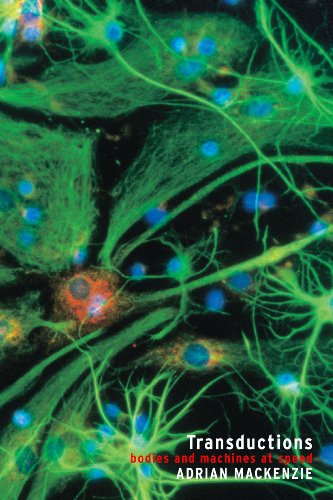Charles Stross: Accelerando (2005)
Filed under fiction | Tags: · artificial intelligence, biotechnology, posthuman, science fiction, technological singularity, technology

“The Singularity. It is the era of the posthuman. Artificial intelligences have surpassed the limits of human intellect. Biotechnological beings have rendered people all but extinct. Molecular nanotechnology runs rampant, replicating and reprogramming at will. Contact with extraterrestrial life grows more imminent with each new day.
Struggling to survive and thrive in this accelerated world are three generations of the Macx clan: Manfred, an entrepreneur dealing in intelligence amplification technology whose mind is divided between his physical environment and the Internet; his daughter, Amber, on the run from her domineering mother, seeking her fortune in the outer system as an indentured astronaut; and Sirhan, Amber’s son, who finds his destiny linked to the fate of all of humanity.
For something is systematically dismantling the nine planets of the solar system. Something beyond human comprehension. Something that has no use for biological life in any form…”
Publisher Ace Books, New York, July 2005 / Orbit Books, London, August 2005
Creative Commons Attribution-NonCommercial-NoDerivs 2.5 License
ISBN 0441012841 / 1841493902
390 pages
Adrian Mackenzie: Transductions: Bodies and Machines at Speed (2002)
Filed under book | Tags: · biotechnology, body, machine, speed, technology, time, transduction

“What do the patented data structures embedded deep in the code of an online computer game or the massively complicated architecture of the latest supercomputer used to simulate nuclear explosions have to do with culture, life or meaning? Why does technology attract such wildly differing responses – from fervour to boredom to distrust?
Transductions explores these questions by drawing on science and technology studies, contemporary critical theory and corporeal theory. An exploration of complex technologies such as online computer games, genomic databases and the global positioning system reveals how the borders between bodies and machines, between what counts as social and what counts as technical, are no less diverse and complicated than culture itself. Indeed, they constitute a crucial dimension of contemporary culture. Through a critical analysis of the widely accepted notion that technology speeds everything up, Transductions argues that there are only ever differences in speed. The question for us now is how can such differences be represented?”
Publisher Continuum, London and New York, 2002
Technologies: Studies in Culture & Theory series
ISBN 082645884X
231 pages
Reviews: Matthew Fuller (Convergence, 2003), Kim Toffoletti (Culture Machine).
PDF (9 MB, updated on 2019-11-20)
See also Fibreculture Journal’s issue on “Trans” (2011) co-edited by Mackenzie.
Comment (0)Sheila Jasanoff: Science at the Bar: Law, Science, and Technology in America (1995)
Filed under book | Tags: · biotechnology, dna, genetics, law, science, technology, united states

Issues spawned by the headlong pace of developments in science and technology fill the courts. How should we deal with frozen embryos and leaky implants, dangerous chemicals, DNA fingerprints, and genetically engineered animals? The realm of the law, to which beleaguered people look for answers, is sometimes at a loss—constrained by its own assumptions and practices, Sheila Jasanoff suggests. This book exposes American law’s long-standing involvement in constructing, propagating, and perpetuating a variety of myths about science and technology.
Science at the Bar is the first book to examine in detail how two powerful American institutions—both seekers after truth—interact with each other. Looking at cases involving product liability, medical malpractice, toxic torts, genetic engineering, and life and death, Jasanoff argues that the courts do not simply depend on scientific findings for guidance—they actually influence the production of science and technology at many different levels. Research is conducted and interpreted to answer legal questions. Experts are selected to be credible on the witness stand. Products are redesigned to reduce the risk of lawsuits. At the same time the courts emerge here as democratizing agents in disputes over the control and deployment of new technologies, advancing and sustaining a public dialogue about the limits of expertise. Jasanoff shows how positivistic views of science and the law often prevent courts from realizing their full potential as centers for a progressive critique of science and technology.
With its lucid analysis of both scientific and legal modes of reasoning, and its recommendations for scholars and policymakers, this book will be an indispensable resource for anyone who hopes to understand the changing configurations of science, technology, and the law in our litigious society.
Foreword by Richard C. Leone
Publisher Harvard University Press, 1995
Twentieth Century Fund Books/Reports/Studies
ISBN 0674793021
303 pages

